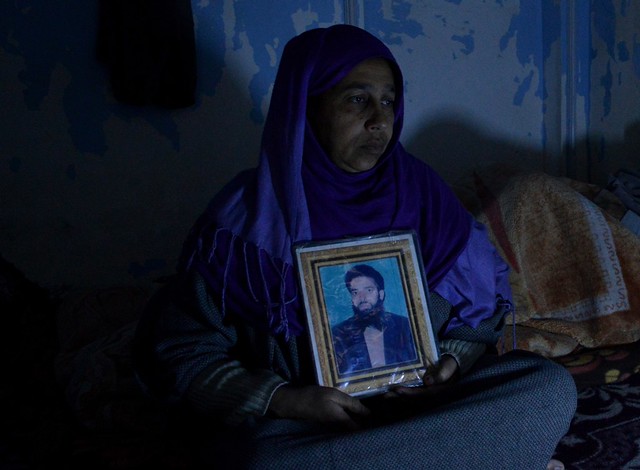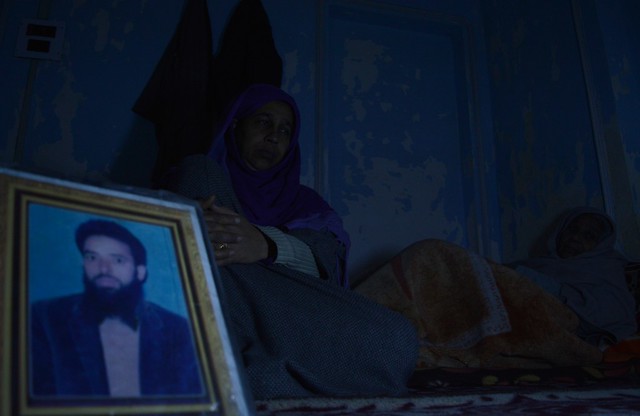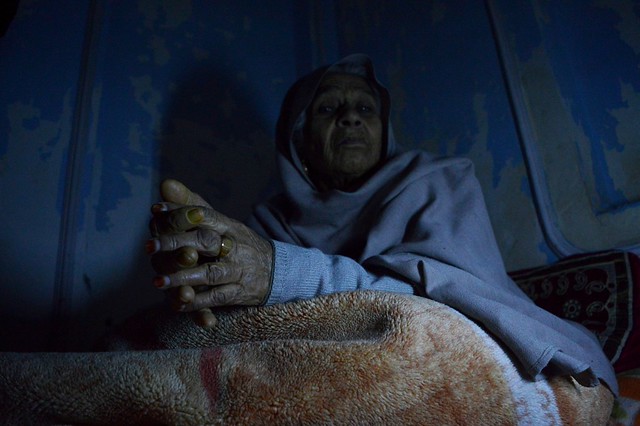In the last of the five personal stories of half widows, Raqib Hameed Naik narrates the story of Shabnum Wani.
Bemina (Srinagar): On July, 6 1997, the summer capital of Jammu and Kashmir, Srinagar was simmering with intense heat. However, this also meant that marriages and ring ceremonies, which Kashmiri families usually avoid organising in winters due to the bone-chilling cold, were on in full swing.
For the Wani family living in Bemina, it was a day scheduled for taking part in ring ceremony of one of their relatives in Batamaloo, Srinagar. Everyone was getting ready to leave for Batamaloo to take part in the ceremony except Abdul Rashid Wani, then a 30-year-old truck driver and the husband of Shabnum Wani.
Rashid had to visit a trader in Parimpora, Srinagar to deliver an amount of Rs 21,000 for the wood which he had supplied to a dealer outside Kashmir. As he went outside to start the scooter parked in the yard, a friend passed from nearby. He too accompanied Rashid to the trader in Parimpora.

Little did he know: some army men were following him in a public vehicle. The moment he reached near JVC Mandi, the army vehicles overtook his scooter and stopped in front of him. At once they pounced upon Rashid, and took him inside the vehicle and drove away leaving behind his friend and scooter on the road.
The other family members, who were still at their relatives place, came to know of the incident only when they came back at their home at 5pm that day. A man from neighborhood came to inform them that, “Army nevw Molvi Soeb (Army has picked up Molvi saeb).”
Rashid was a practicing Muslim with a pencil beard.
“That time I was sure that they won’t do anything with him because he was just a poor truck driver and not a militant,” says Shabnum Wani, 50, wife of Abdul Wani.
There was no word or information available to the family as to which army battalion had picked him up. After two days, Shabnum went to search out for the public vehicle which the Army men had hired on that day fateful day. Fortunately, she found one driver who acknowledged a bearded man picked up by the Army in his vehicle from JVC Mandi.
The driver told Shabnum that the Army men were from 2/8 GR, Gorkha Rifles camped at Rawalpora Srinagar and their commander, Capitan Yadav, had hired his vehicle that day. “The driver told me that Capitan Yadav had said that we have to pick any bearded man who comes in front of us,” recalls Shabnum
He further told that her husband was first taken to an army camp in Sanat Nagar where Capitan Yadav got down from the vehicle to discuss something with officers inside the camp and later took him to Rawalpora camp.
A day after meeting the driver, Shabnum along with his family members went to meet Capitan Yadav in Rawalpora Camp. “I told him that you have picked up my husband, an innocent truck driver who has nothing to do with the militancy,” she recalls asking the Capitan.
The Capitan acknowledged detaining him and told her, “Wo zakhmi hai abhi, jab theek hoga, mulakaat karva doon ga tumhari” (He is injured now. When he is well, we will arrange for you to meet him)

As days passed into a month, the Captain deliberately used delaying tactics, never allowing Shabnum to meet Abdul. Once he was fed up of her visits, he threatened, “Wo yahan nahi hai, aur baar baar mere pass mat aao, warna raat ko aake sab ko maar dunga, (He isn’t here and don’t dare to visit me again, else I will come at night and will kill all the family members).”
Filled with terror, Shabnum returned home fearing for the life of her two sons Junaid and Arsalan who were then 11 and 7 years old. “He was an animal. He could have really come at night to kill us all,” she said.
She started to look for her husband on her own; in jails, army camps in Uri, Baramullah, Shriefabad, Badamibagh , Kot Bhalwal and various army camps in Jammu division of J&K.
Two months after the disappearance of Rashid, Shabnum’s brother-in-law suggested to file a case in High Court. However, the case continued till 2003, when the High Court passed directions to the lower court for filing an FIR who later directed Parimpora, Police station to initiate investigation in the case. “FIR was filed seven years after his disappearance which mentioned that my husband was subjected to custodial disappearance,” says Shabnum.
The same year, Shabnum’s mother Azi Begum, 75, suffered a major heart attack. She had to be shifted to AIIMS Delhi, where she took months to recover. Since Shabum was in Delhi to attend to her mother, there was no one to attend the hearings in Court. In between, she also went to State Human Rights Commission but left the case midway realising that she can’t get justice.
Azi Begum, who is now bed ridden vividly remembers, how a Commanding Officer from Shriefabad Army camp had came to their home in early 2000 to coerce her daughter to withdraw the case, “Hum se baat karo. Jo kuch bhi chahiye, hum denge, magar ye case wapis lelo, (Talk to us. Whatever you need, we will give you: but take back this court case,) but my daughter put a brave face and told him that, “I just want to know what happened to him,” recollects Azi.

Rashid’s disappearance also meant the loss of the family’s breadwinner and its consequences were severe, as we have seen all through this series. Shabnum’s father, then a septuagenarian, had taken retirement from work due to his failing health. However, he had to resume work in a transport company to support his daughter and earn for the educations of his grandsons.
“After the Army picked up the lone bread earner of my family, I was left with no one to support me financially. My father started working to feed me and my two sons,” says Shabnum.
After her husband’s disappearance, she has experienced tension and post-traumatic stress disorder (PTSD) for which she takes medicines regularly. “I feel depressed and can’t sleep most of the times. I have been advised by the doctor to take medicines regularly. It is costing me Rs 1,500 per month, which at time becomes difficult to arrange,” said Shabnum.
Her elder son Junaid Ahmed, 30 studied till 12th standard and started to work as a driver to support her mother financially whereas her younger son Arsalan Ahmed, 26, finished his graduation in commerce but without a job, he too works sometimes as a driver to add to the family income.
“Had my husband been here with us, my both sons would have got better education and could have achieved what they had dreamt of. It wasn’t only me who lived a life of ‘half widow’ but my sons too had to live a life of ‘half orphans’ which pains me at heart every time when I think about it,” says Shabnum as broke in tears.
For the past decade her so, Shabum has joined other women to protest at Pratap Park, Lal chowk for monthly sit in to seek justice against the continued disappearance of her husband. “From Governments to courts everyone has betrayed us. Now this is the last resort left to us,” she says. The wait continues.
Read Part-I here: Armed with a pictures that tell a thousand words: The protestors of Pratap Park
Read Part-II here: The half widows of Kashmir: A story of endless wait and hardships
Watch Short Film here: Half Widows of Kashmir
Read Part-III here: Married at 17, ‘Half widowed’ at 18: Safiya Azad continues to wait even after 23 years
Read Part-III (2) here: 19 years and counting: the tale of Naseema Begum’s wait for her missing husband
Read Part-III (3) here: Half-widowed at 23, Rafiqa Mushtaq fights government, in-laws to ensure property rights for her children
Read Part-III (4) here: Picked up from an Army ‘crackdown’, never to return: Dilshada Begum’s 23-year search for her husband continues

